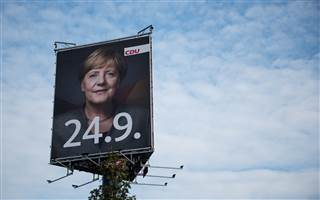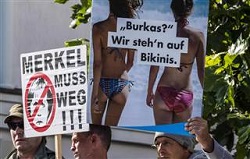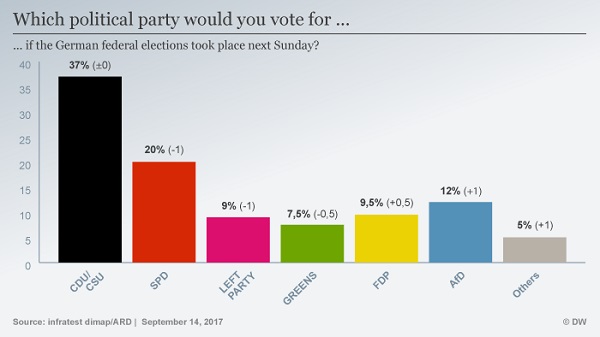 I’m told Germans have little respect for politicians, rating them at the bottom of the pile. Generally, though, they are said to be courteous, even boring in how they conduct their politics, although it doesn’t altogether look that way from the outside.
I’m told Germans have little respect for politicians, rating them at the bottom of the pile. Generally, though, they are said to be courteous, even boring in how they conduct their politics, although it doesn’t altogether look that way from the outside.
However, this time policies are not so much to the fore, it’s really about the Merkel model of how to succeed in politics – unobtrusive, appearing ordinary and not of the elite, while
- A large part of Merkel’s success lies in her consummate mastery of the German political system. Quite simply, she has what it takes to win in German politics. She is cautious, pragmatic, strategic, patient, and is imbued with the traditional Christian Democratic certainty that the integration of interests provides a sound basis for governance. She is an outstanding mediator. At times these attributes have infuriated supporters and critics alike, but they have worked for her.
Merkel has a keen instinct for shifts in public opinion and is swift to occupy new ground. This maddens the opposition SPD, which often complains that the union parties are “stealing their clothes”, making it difficult for them to develop a distinctive policy platform.
She has genuine mediation and problem-solving skills, unlike our bloke.
Her style has generated the verb “merkeln”, which means to delay a decision or deliberate. The word:
- is used more with affection than malice, but it is also indicative of a frustration with her approach to politics.
So rather than policies, the election this time is more a presidential affair, not for a charismatic leader, rather of a steady hand who people can trust to deliver more of the same.
The German think-tank Bertelsmann Foundation found that 80 percent of German voters described themselves as either center-left or center-right, compared to a European average of 66 percent.
ABC RN had at least two excellent reviews of what is happening in Rear Vision and Late Night Live.
Merkel became Secretary General of the CDU (Christian Democratic Union) in 1998, and leader in 2000, winning narrowly the election in 2005 to form a grand coalition with the centre-left SPD. From the beginning she took the CDU to the left. In grand coalition again since 2009, she has been given the credit for many policies which came from the SPD.
They are sick of it, and will not form a coalition this time without a party plebiscite. So the likelihood is that there will a “Jamaica coalition” (it’s about the colours on the Jamaica flag) of the CDU/CSU, the Greens and the Free Democrats (FDP). However, the policies of the FDP are more than a little libertarian, which may produce some incompatibilities.
This article looks at how Angela Merkel has swallowed up the left.
Martin Hikel, the chairman of the SPD branch in Neukölln, an SPD stronghold in western Berlin and home to the city’s large Turkish community, said Merkel’s pleasing political style had led to the “depoliticisation” of Germany:
“Merkel’s politic has followed public opinion, which means there has been no competing ideas nor real debate. This is posing a threat to our democracy. After we joined the grand coalition, people could no longer see the differences between us and the CDU. People are looking for an alternative but cannot find one,” he said.
SPD party leader Martin Schulz says Merkel has no policies except “trust me” which leaves many angry and frustrated.
The right-wing nut jobs, the AfD (Alternative for Germany) and Die Linke (the Left) are basically protest parties. We can be grateful the AfD will probably not get beyond 10 to 12%.
The rest of the world can be grateful that Merkel is not afraid of the kleptocratic bullies like Putin, Trump and Erdogan. Merkel was Time Magazine’s 2015 person of the Year and has topped Forbes’ list of the world’s most powerful women 9 times.
Some say, however, that her style and success is a threat to German democracy. Certainly her fourth term is likely to be her last, and people are pondering, who and what comes next.
Along the way AfD is having leadership issues. Here’s what Deutsche Welle says you need to know. One of the leading lights is Alice Weidel, ex-Goldman Sachs and lives in Switzerland with her Sri Lankan-born wife, bringing up a couple of boys. Not the usual background you’d expect.
 One of the experts explained that AfD was anti-immigration and anti-Muslim, but not racist as such. They have been clever in putting their message forward. The image on the left says ““Burqas? We prefer bikinis.”
One of the experts explained that AfD was anti-immigration and anti-Muslim, but not racist as such. They have been clever in putting their message forward. The image on the left says ““Burqas? We prefer bikinis.”
Another shows a pregnant woman with “New Germans? We will make them ourselves.”
Here’s a poll via Deutsche Welle:

If we get another grand coalition, the AfD could be the official opposition, which will give them automatic prominence.
It’s worth noting, though, around 60% of voters will vote for someone else, and post Merkel, or if the economy stutters, German politics could again become volatile.
Der Spiegel has an interesting article about the demise of social democratic parties in Europe. European democracies are essentially built on social democratic ideas, yet as societies become more unequal, no-one knows what social democratic parties stand for. The economy and society are changing.
- Social democrats were once the protagonists in one of mankind’s greatest stories. In Germany, they vowed to improve the lot of workers and lead mankind into a new era. They breathed life into German democracy and, by forming a coalition with the Green Party, eventually made their way into the Chancellery. The battles it fought took place in a young, optimistic society.
We no longer live that way. Like other European nations, Germany has become an older, post-heroic country. Most German fears relate to threats from outside: climate change, new wars, crises triggered by unpredictable dictators and refugees flooding into the country unchecked.
Such issues have not thus far been the domain of social democrats. Social democrats want to jointly pursue a better society. But they need to be able to explain what that means. If they manage to find that story, they could still be one of the most powerful stories in politics.

Mummy!
Yes, she’s like super-mum to a big family of kids, who are a bit headstrong, but she sorts things out and keeps them more or less on track.
Antony Green explains the German voting system.
Merkel is a little island of sanity in an ocean of nutjobs, IMHO.
Meanwhile, Frauke Petry, leader of the AfD, announced at the party’s “victory press conference”, that she would sit in the Bundestag as an independent, not with the AfD.
Some victory!
Some leader!!
(to paraphrase Mr Wiñston Churchill)
I’d missed that, Ambi. I thought she was off having her fifth kid. Wikipedia has the general story, and it seems she did have number five with her new partner in May.
Seems the party was what you might call fractious.
I suspect the CDU/CSU would be disappointed with 32.8% of the vote, and the Afd would be pleased with 13.2%.
All the smaller parties improved their position, the SPD looks adamant about staying in opposition and forming a coalition with the FDP and the Greens looks challenging.
Danke Schoen, Brian.
Fractious indeed.
The SPD must be very disappointed with such a poor showing too. It’s consistent with the story that Angela Merkel has been steadily helping social democratic ideas to “wither away”.
My guess is that AfD may have picked up some former SPD voters too, mainly because of the immigration flood.
(I’m recalling the so-called “Howard battlers”, LNP voters ostensibly belonging to the so-called working class.)
Ambi, I got this from Facebook:
SPD lost votes to just about everyone. From Merkel’s mob they went straight to AfD.
The Left lost votes to AfD, but picked up a similar number from SPD.
Thanks Brian
That’s a very clever graphic device.
No need for groundless guesswork when actual electoral results are displayed in full like that.
After the admonition from Mr J about objectivity, I now realise I shouldn’t have referred to “the immigration flood”, because flood
has mostly negative connotations for urban humans.
***
Meanwhile, back on the floodplains, the biota and ecology are smiling enigmatically. If I may anthropomorphise “the ecology” for a moment.